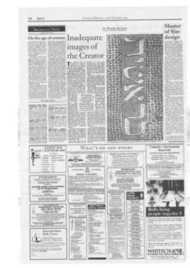Page 6, 15th October 1993
Page 6

Report an error
Noticed an error on this page?If you've noticed an error in this article please click here to report it.
Tags
Share
Related articles
That Infirm Glory Of A Positive
Poetry
‘i Love Ritual, Incense And Latin’
New Poetry For Today
Academic Stuffymindedness
From Scripture to stanza, parable to poetry
Chapters into Verse: Poetry in English inspired by the Bible (2 volumes) edited by Robert Atwan, Oxford University Press. £35 THE IDEA OF THIS anthology is to collect a vast mass of poetry in our language which can be called a response to particular verses of scripture. The editor's range has been extremely wide, the original Bible passages are quoted as if the poems were a commentary on the Bible, and modem as well as ancient poets have been reprinted.
The taste in poetry does sink, at times, embracing poets who are interesting, rather than famous and always admired, but it also embraces some delightful surprises.
I cannot imagine the work as a whole being better done, even though there are sometimes alternatives one might suggest. But, equally, I cannot imagine who this huge anthology is
for. Maybe its market is to be found in America, where poetry is more often used than it is here as an alternative to scripture?
Perhaps that habit is more widespread than one imagines: it raises the question of what use is mystical, metaphysical or biblical poetry? Poetry is, after all, essentially human and secular, it is an art you may exercise or enjoy with any religion or none. I remember an infuriated Oxford don refusing to lecture on the scriptures of a religion in which he did not believe. What he meant was, as a Greek scholar, the Acts of the Apostles were to be allowed over his dead body. How odd, thought a colleague, that he lectures on Pin dar.
Still, the Bible has not yet been as neutralised as the classics, and I think those who seriously believe it will find this anthology less appetising than those to whom the Bible is fuzzier and vaguer. The mysterious and "inspiring" qualities of poetry are not identical with the mysteries of religion or the "inspiration" of Scripture. All the same, just a look through this anthology would give almost anyone, a historian, a theologian or even a literary or a cultural scholar something to think about. Only that in the end it is no more successful than that Bible of about 30 years ago that was full of Old Masters reproduced in colour.
There are probably too many modern poets of somewhat untried worth, though the piece by Allen Ginsberg is wonderfully apposite and powerful. It is the 17th century that produces some really terrible poets: it vomits them out as that century poured out its flood of pamphlets. Quarles commented on every verse of a book of the Bible, in verse of his own, and at length. Though to be fair this anthology restrains him.
On the whole, everyone is in. Skel ton, Smart, Southwell and Henry Vaughan many times over, but also CS Lewis, Philip Larkin, Robert Lowell, and Hugh MacDiarmid.
The whole enterprise obscures the well-known fact that a large part of the Bible already is poetry. The reader can tell what is and what is not by the tone, I suppose, yet the necessity of translation obscures that hopelessly. Passages take on a beauty or an obscurity that the Bible did not intend. On the other hand, it is a curious and providential fact that uniquely in all literature, the Gospel translates into every language with the same salty plainness, the same inner brilliancy. Which poems do not have.
. An anthology of verse responses to Scripture is like a meal of fish paste and no bread. One would do better to stick to the Bible itself, as most of these poets would have agreed.
PETER LEVI
blog comments powered by Disqus













